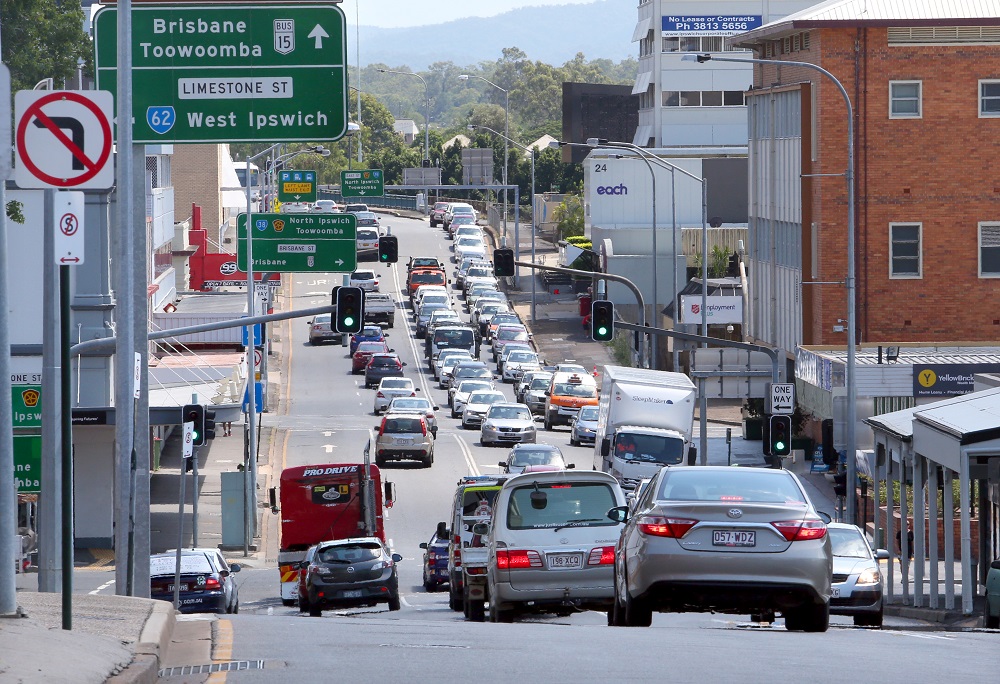Ipswich City Council is moving forward with the delivery of iGO – The City of Ipswich Transport Plan, but notes an increasing trend of private motor vehicle use, which could stretch the region’s road network.
A special report presented to the Growth, Infrastructure and Waste Committee this week recommends more State Government investment and resources for sustainable modes of transport is required for a city expected to more than double its current population of 230,000 by 2040.
“From July 2019 to June 2020 a number of actions from iGO – The City of Ipswich Transport Plan have been completed or progressed,” the report said.
“Despite this, recent data provided by the 2018 Household Travel Survey is indicating that the use of private vehicle travel has continued to gradually increase since 2011 in the Ipswich LGA to 88.4 per cent, diverging further away from the iGO private vehicle mode share target of 75 per cent.”
Committee Chair, Mayor Teresa Harding said Council is focussed on delivering and advocating for investment in safe, sustainable and effective transport solutions.
“Ipswich is the fastest-growing region in Queensland – our population increased at a rate of 4.6 per cent in 2018/19. By 2041, our city will welcome another 336,000 residents, increasing our current population from 222,000 to 558,000,” she said.
“We are committed to keeping Ipswich prosperous and liveable as our city grows, and this means working across all levels of government to secure a range of transport solutions.
“The deliverables in this report respond to feedback from residents highlighting areas of significant need.”
The report states that there is a risk that essential strategic transport projects will not be in place to meet the needs of the city’s expected growth, without further investment from the State Government.
“In order to achieve the goals and outcomes identified in iGO, more resources and investment is required to facilitate the implementation of iGO infrastructure projects as per planning requirements.
“This includes further consideration and support of more sustainable modes of transport and emerging transport technologies.
“Our future transport network needs to be able to adapt to emerging, more sustainable technologies and forms of transport like electric vehicles, electric bikes and scooters, mass public transport and walking and cycling paths.
“Taking into account the recent impact of COVID-19 on public transport patronage, it is considered that without significant State Government investment and support from council on trunk public transport, such as the Ipswich to Springfield Railway line and other high frequency bus routes, it will be very difficult to recover to achieve the desired iGO public transport mode share of 11 per cent.”
The Ipswich Central to Springfield Central public transport corridor, known as I2S, is a high priority with council and advocacy group Ipswich Leaders Alliance, with continued advocacy at both state and federal level hoping to seek financial support for a business case and ultimately construction of the 25km rail line.
One of the recommendations considered by councillors was that council continue to support iGO and give regard to the iGO mode share targets and a shift to more sustainable forms of travel in Ipswich when considering future council investment priorities.
The report card also highlights some of the key achievements from 2019-20, including completion of:
- City of Ipswich Parking Pricing Strategy;
- iGO Public Transport Advocacy and Action Plan;
- iGO Road Safety Action Plan;
- iGO Performance and Data Strategy;
- Ipswich to Springfield Rail Corridor – Strategic Business Case;
- Ipswich City Centre Cross River Connectivity – Preliminary Business Case;
- Redbank Plains Road Stage 4 Corridor Plan;
- Ipswich Inner CBD Cycle Network Corridor Plan;
- Upgrade of Old Toowoomba Road, Leichardt;
- Upgrade of Brisbane Street, West Ipswich;
- Salisbury Road and Briggs Road new signalised intersection;
- School Road and Fernbrooke Boulevard new signalised intersection; and
- Construction of Brassall Bikeway Stage 7.
“Council is continuing to deliver the strategies, plans, designs and undertake the promotional and advocacy activities which have been set out in iGO as well as delivering new and upgraded transport infrastructure for the people of Ipswich,” the report concluded.
“A focus on sustainable technology and forms of transport and less emphasis on road based trips and infrastructure is required if iGO’s future mode share targets are to be achieved and costs to council are to be maintained at sustainable levels.”
Cr Andrew Fechner said the report card was honest and highlights some of the work that needs to be done with Ipswich’s transport network.
Read More

